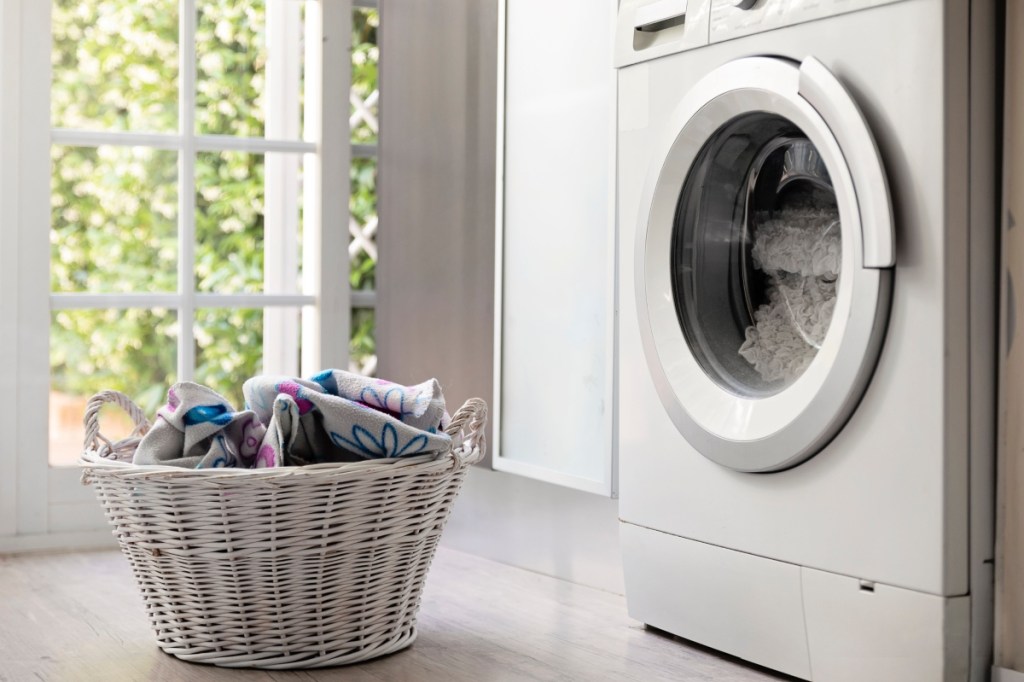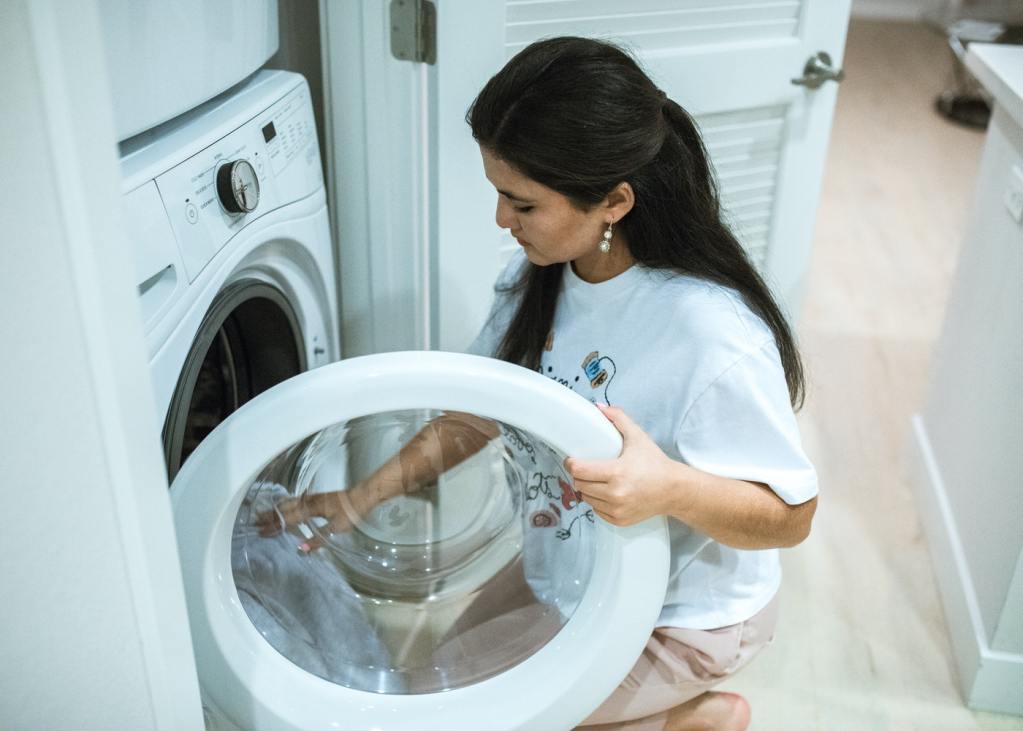If you own a home or condo, odds are you have a washer and dryer, but have you ever thought about the pros and cons of gas dryers vs. electric dryers? When you’re in the market for a new dryer, you may feel forced to get the type of dryer your house is set up for. If you’re building a house or have both hookups in your home, then you can choose which type you’d like.
Regardless of your current dryer situation, the differences between the two types are helpful to know. Which is cheaper to run? Which is easier to troubleshoot or work on yourself if repairs are necessary? Which one dries clothes faster? Here are the big differences between gas dryers vs. electric dryers so you can understand your system better or pick a new one that you prefer.

Similarities of gas dryers vs. electric dryers
Both electric and gas dryers have an inner coil that heats and uses a fan to move the heat around your wet clothes. All dryers have an internal drum that rotates and tumbles the clothes around. All dryers also require an electrical outlet because electricity runs the tumbler and fan regardless of the heat source. These are the similarities that all dryers share. Now, let’s examine the major differences.

Pros and cons of gas dryers
Gas dryers use a gas burner to generate the heat that dries your clothes. When you push the “on” button, a sensor on the motor lights the ignitor, which then opens the gas valve. This completes the heating part of the system. The electric fan, as mentioned above, circulates the heated air, and once the desired temperature is reached, the gas valve shuts off.
The internal thermostat checks the air temperature throughout the cycle, and if the temperature drops, the gas valve and ignition process start over. The process of ignition creates combustion, which produces carbon monoxide. This is why gas dryers must be vented either outdoors or into an HVAC ventilation system.
Con: Gas dryers cost more
Gas dryers typically cost more than electric dryers. On average, a gas dryer will cost about $100 more than the electric version of the same model. However, when you get into higher-end dryers, the cost difference between the two decreases, and increased cost becomes more about features than the type of energy you are using.
Con: Gas dryers cost more to install
Gas dryers are also more expensive to install than electric dryers. Gas dryers must be installed by licensed plumbers because the gas-line connections must be carefully fitted and then tested to ensure there are no gas leaks. Maintenance costs can be higher for gas dryers as well, due to the fact that many require a professional technician.
Pro: Gas dryers cost less to run
Although many of the factors above make gas dryers more expensive, gas dryers actually cost less to run than electric dryers. In most areas, natural gas (or propane) is less costly than electricity, which makes running the dryer cost less. Gas dryers also work faster than electric dryers. Not only will you save money on the energy bill because gas is cheaper than electricity, but you will also save money due to the amount of time it takes the dryer to dry your clothes. Typically, it takes a gas dryer about half the time of an electric dryer to dry a load of clothes.

Pros and cons of electric dryers
As we mentioned, all dryers use a heating coil to heat up air and move that air around your wet clothes. Electric dryers heat up the coil using electricity via a 240-volt current. You can find out if you have a 240-volt plug by looking at the outlet. If the outlet looks like a regular outlet but id oversized, you have the correct hookup. These outlets can be three-prong or four-prong, though most new construction will have a four-prong head.
Pro: Electric dryers have ventless options
Most electric dryers require venting just like their gas counterparts. However, you can get ventless electric dryers, and they are commonly used in compact areas such as apartments. Ventless dryers use a method called condensation dry, which means that instead of exhausting the heated air, the dryer uses a heat exchanger to cool the air and condense the water created by doing so into a drainpipe or collection tank.
Dryers that utilize the non-vented method require routine maintenance to ensure they are performing correctly. Also, though termed non-vented, these dryers need to be placed in an area that has proper ventilation because they expel hot air back into the space that they occupy.
Pro: Electric dryers are cheaper
In terms of overall cost, electric dryers are cheaper on the low end than gas dryers. However, as we mentioned, when you get to higher-end dryers, there is little price difference between a gas dryer and an electric dryer. Ultimately, features such as quiet operation, steam cycles, and energy-saving functionality end up costing you more regardless of the type of energy your dryer uses. However, ventless electric dryers do cost a bit more than vented electric dryers.
Pro: Electric dryers are simple to install
Electric dryers are simple to install; and thus, are cheaper to install than gas dryers. All you have to do to install an electric dryer is plug it in. There is no need for a licensed professional, who you would need for a gas dryer installation. The maintenance of electric dryers is typically more straightforward than it is with gas dryers, so this saves money, as well. Replacing a belt or switch on a gas dryer usually requires a service call from a technician. Meanwhile, the same maintenance on an electric dryer can generally be completed by a handy DIYer.
Con: Electric dryers cost more to operate
While electric dryers may be cheaper to buy and install, they do cost more to operate. Typically, electricity is more expensive than natural gas or propane, so running an electric dryer is going to cost you more monthly. Also, electric dryers take longer to dry clothes than gas dryers do, so the total cost to operate an electric dryer is much more than a gas dryer.

Life span of gas dryers vs. electric dryers
The lifespan of gas dryers and electric dryers can vary, but several factors influence their longevity. Typically, gas dryers tend to have a longer lifespan than electric ones. They’re simpler in design and have fewer components that can wear out over time. They also produce less heat during operation, which can reduce wear and tear. On average, gas dryers can last anywhere from 13 to 15 years with proper maintenance.
In contrast, electric dryers may have a slightly shorter lifespan, typically ranging from 11 to 13 years. The heating elements in these dryers are subjected to higher temperatures, leading to more frequent wear and replacement. However, with regular maintenance and care, both gas and electric dryers can provide reliable service for many years.

Dryer safety tips
Regardless of whether you have a gas dryer or an electric dryer, both require some similar measures in order to keep your household safe and your machine operating efficiently:
- Make sure to empty the lint filter after each load.
- The lint filter compartment should also be cleaned two or three times a year.
- The dryer venting tube should be cleaned by a professional at least once a year.
- Metal ducts work better than accordion-style ducts at preventing lint buildup and creating better airflow.
Overall, the costs to purchase and operate both types of dryers end up pretty much even. There are mild safety concerns with both gas and electric dryers: Gas dryers could have an improperly fitted gas line and pose a fire hazard. Gas dryers also emit carbon monoxide and must be adequately vented or pose a poisoning risk. Electric dryers also can start a fire due to faulty wiring.
When it comes to gas dryers vs. electric dryers, it is important to know the differences and understand how yours operates. Regardless of the type of dryer you choose or have to get because of your current setup, there are pluses and minuses to each.




